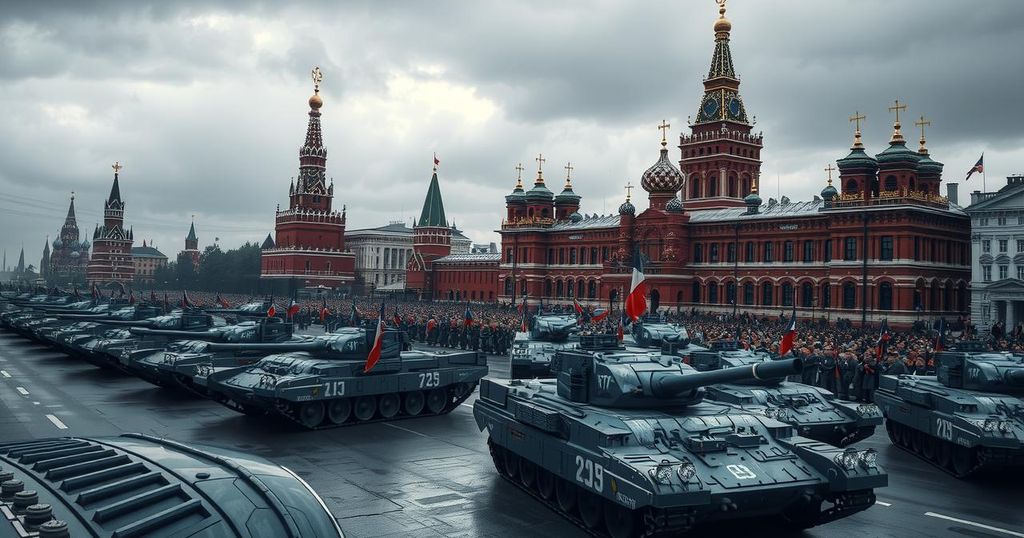World news
AFRICA, ANDREW NEIL, BIDEN ADMINISTRATION, CUBA, ENERGY INFRASTRUCTURE, EUROPE, EUROPE/ASIA, GEOPOLITICS, INTERNATIONAL RELATIONS, KIM JONG UN, MOSCOW, NORTH AMERICA, PUTIN, REPUBLIC OF CONGO, RUSSIA, RUSSIA-UKRAINE WAR, SOUTH AMERICA, UKRAINE, VENEZUELA, VLADIMIR PUTIN, WAR, XI, ZIMBABWE
David O'Sullivan
0 Comments
Europe’s Complacency Amid Rising Autocratic Threats
Moscow held a Victory Day celebration highlighting autocratic alliances. Key figures included Putin and Xi, with North Korea and Iran providing military support for Russia’s ongoing war in Ukraine. Concerns grow over Europe’s complacency in the face of this geopolitical threat, emphasizing a need for urgent reassessment of defense strategies.
In a striking showcase, Moscow recently held a commemoration marking the 80th anniversary of the end of World War II in Europe—an event that ironically coincided with the presence of leading autocrats from nations such as Belarus, Iran, and Venezuela. President Vladimir Putin, hosting figures like China’s Xi Jinping, highlighted not just a remembrance of tyranny past but a stark present where alliances among oppressive regimes seem to be flourishing. Especially concerning to observers is the growing power of this alliance, which includes the ‘Crinks’—a term to describe the coalition of China, Russia, Iran, and North Korea.
The implications of these gatherings reverberate beyond Moscow. At a concurrent London Defence Conference, experts discussed the serious geopolitical threats posed by the Crinks, who are cooperating militarily and economically to undermine democratic ideals. President Putin’s army, now bolstered by support from the likes of Iran, is receiving crucial resources such as Shahed-136 attack drones and short-range ballistic missiles aimed at Ukraine, which shows the tangible effects of this alliance.
With North Korea also supplying a staggering arsenal of military hardware—20,000 containers of missiles and artillery had already been sent by last October—Europe’s leaders seem to be missing the gravity of these developments. Casualties do not deter Putin; instead, they invigorate his ambition to strengthen a military force that might well surpass Western capabilities—something the West has not fully grasped yet.
Intriguingly, China remains careful not to provide direct military assistance, but it has taken on a crucial role in rebuilding Russia’s war machine. Notably, 70% of Russia’s machine tools and an overwhelming 90% of its microchips are sourced from China. The economic ties run deep, with China purchasing vast quantities of Russian oil, which sustains Putin’s regime even as sanctions loom.
But the real danger lies ahead. As Europe contemplates its responses, complacency appears an all too common theme among its leaders. For instance, while countries like Poland and the Baltic states recognize the threats posed by the Crinks, other nations lag in urgency. French President Macron’s approach appears hapless, while Germany’s political landscape undergoes a shuffling that does not inspire confidence.
In the UK, Labour leader Keir Starmer’s speech at the London Defense Conference illustrated how political posturing can distract from necessary action. His proposed increase in defense spending seems insufficient against the backdrop of a looming military threat. What’s clear is that Europe’s security and NATO will require recalibration, especially considering ongoing doubts about American commitment under fluctuating bipartisan support.
The situation calls for a wake-up call: if American backing may not be as reliable, European nations, particularly the UK as the region’s foremost military power, must step up. Proposals include restructuring NATO or forming new coalitions among like-minded states—prioritizing defense spending and strategy over political calculations. Failure to do so could leave Europe vulnerable to a stronger, united front of autocrats intent on further malign influence across the globe.
In summary, the current state of European security is precarious, as the alliance of autocrats presents an undeniable threat. The meeting of leaders in Moscow symbolizes a deeper collaboration that undermines democratic values worldwide. European politicians must overcome complacency and take decisive steps to enhance military preparedness, while adapting their defense strategies in light of potential shifts in American support. The future hinges on the ability to build coalitions based on shared values—not empty rhetoric.
Original Source: www.dailymail.co.uk




Post Comment